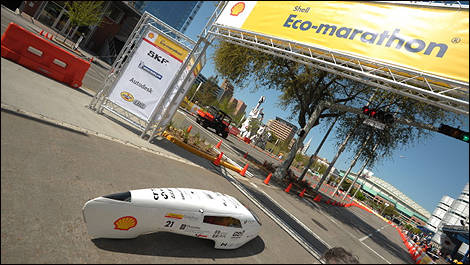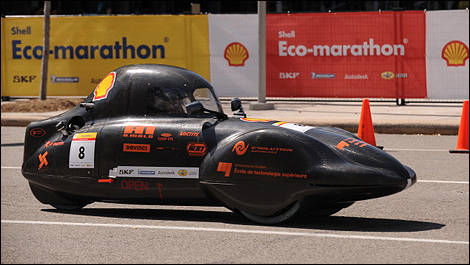As reported by Shell
Calgary - Laval University for the second year in a row won the grand prize in the "Prototype" category at the 2010 Shell Eco-marathon Americas this past weekend in Houston, Texas. The student-built, fuel-efficient vehicle achieved the farthest distance using the least amount of fuel with an astonishing 1,057.5 kilometres per litre, or 2,487.5 miles per gallon.
In the "UrbanConcept" category, the team from Mater Dei High School in Evansville, IN also took the grand prize for the second year in a row by achieving 185.87 km/l or 437.2 mpg.
"There was a lot of tough competition this year, plus, participating in this challenge on the street course for the first time was also a whole new experience for us," said Bruno Leduc of Laval University. "But we put a lot of time and energy into our vehicle this year and are very proud of how we did. We are so excited to be the 2010 Shell Eco-marathon Americas champions!"
Overall, 42 student teams competed in the 2010 Shell Eco-marathon Americas(R), a challenge for students to design, build and test fuel-efficient vehicles that travel the farthest distance using the least amount of fuel. More than 400 students were on hand in downtown Houston to stretch the boundaries of fuel efficiency and participate in the first-ever street course challenge for the Americas event.
Other participating Canadian schools included Dalhousie University, University of Toronto, University of British Columbia, University of Ottawa and Ecole de technologie superieure (University of Quebec Engineering School).
With 48 vehicles testing on the Houston street course, competition was steep. This year's challenge brought together a number of returning teams determined to beat the winning 2,757.1 mpg (1,172.2 km/l) achieved by Laval University (Quebec, Canada) in 2009, combined with a number of new teams adding fresh innovation and vehicle designs to the competition.
"It was so fun to see all the innovative vehicles out on the streets of downtown Houston this year," said Mark Singer, global project manager for the Shell Eco-marathon. "The Shell Eco-marathon allows students to let their imaginations run wild, which is what we love to see. It takes all of us to help find solutions to meet the world's energy challenge, and there's no better time to start making energy innovations and efficiency a priority."
Student teams were invited to participate in either the Prototype or UrbanConcept categories. For the Prototype category, teams entered futuristic prototypes - streamlined vehicles focused on maximizing fuel efficiency through innovative design elements, such as drag reduction. For the UrbanConcept category, teams entered more "roadworthy" fuel-efficient vehicles. Aimed at meeting the real-life needs of drivers, these vehicles are closer in appearance to the cars seen on roads today. For both categories, teams could use any conventionally available energy source - including fuels such as diesel, gasoline and liquid petroleum gas (LPG), as well as alternative fuels such as hydrogen, biomass and solar.
The 2010 Shell Eco-marathon Americas roster contained 42 teams from 9 high schools and 28 universities from across the Americas. Additionally, two guest teams from Italy joined the roster with their Prototype and UrbanConcept vehicles.
Calgary - Laval University for the second year in a row won the grand prize in the "Prototype" category at the 2010 Shell Eco-marathon Americas this past weekend in Houston, Texas. The student-built, fuel-efficient vehicle achieved the farthest distance using the least amount of fuel with an astonishing 1,057.5 kilometres per litre, or 2,487.5 miles per gallon.
 |
| Laval University (Photo: Shell Eco-marathon) |
In the "UrbanConcept" category, the team from Mater Dei High School in Evansville, IN also took the grand prize for the second year in a row by achieving 185.87 km/l or 437.2 mpg.
"There was a lot of tough competition this year, plus, participating in this challenge on the street course for the first time was also a whole new experience for us," said Bruno Leduc of Laval University. "But we put a lot of time and energy into our vehicle this year and are very proud of how we did. We are so excited to be the 2010 Shell Eco-marathon Americas champions!"
Overall, 42 student teams competed in the 2010 Shell Eco-marathon Americas(R), a challenge for students to design, build and test fuel-efficient vehicles that travel the farthest distance using the least amount of fuel. More than 400 students were on hand in downtown Houston to stretch the boundaries of fuel efficiency and participate in the first-ever street course challenge for the Americas event.
Other participating Canadian schools included Dalhousie University, University of Toronto, University of British Columbia, University of Ottawa and Ecole de technologie superieure (University of Quebec Engineering School).
With 48 vehicles testing on the Houston street course, competition was steep. This year's challenge brought together a number of returning teams determined to beat the winning 2,757.1 mpg (1,172.2 km/l) achieved by Laval University (Quebec, Canada) in 2009, combined with a number of new teams adding fresh innovation and vehicle designs to the competition.
"It was so fun to see all the innovative vehicles out on the streets of downtown Houston this year," said Mark Singer, global project manager for the Shell Eco-marathon. "The Shell Eco-marathon allows students to let their imaginations run wild, which is what we love to see. It takes all of us to help find solutions to meet the world's energy challenge, and there's no better time to start making energy innovations and efficiency a priority."
Student teams were invited to participate in either the Prototype or UrbanConcept categories. For the Prototype category, teams entered futuristic prototypes - streamlined vehicles focused on maximizing fuel efficiency through innovative design elements, such as drag reduction. For the UrbanConcept category, teams entered more "roadworthy" fuel-efficient vehicles. Aimed at meeting the real-life needs of drivers, these vehicles are closer in appearance to the cars seen on roads today. For both categories, teams could use any conventionally available energy source - including fuels such as diesel, gasoline and liquid petroleum gas (LPG), as well as alternative fuels such as hydrogen, biomass and solar.
The 2010 Shell Eco-marathon Americas roster contained 42 teams from 9 high schools and 28 universities from across the Americas. Additionally, two guest teams from Italy joined the roster with their Prototype and UrbanConcept vehicles.
 |
| University of Quebec Engineering School (Photo: Shell Eco-marathon) |


